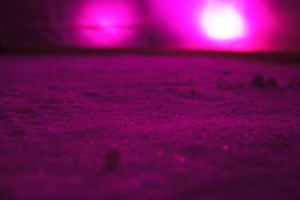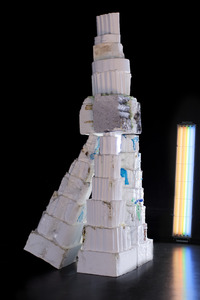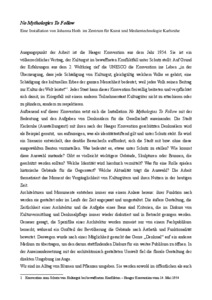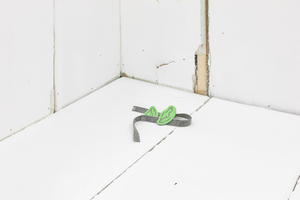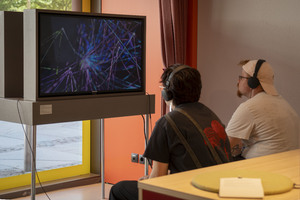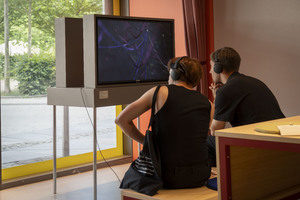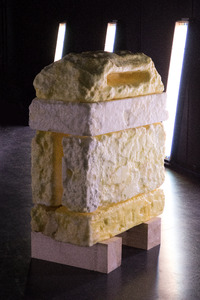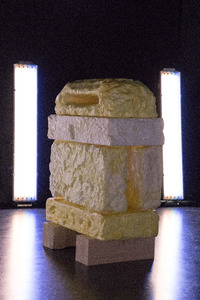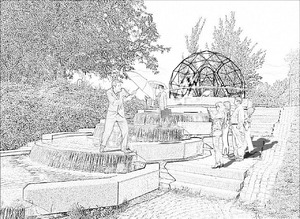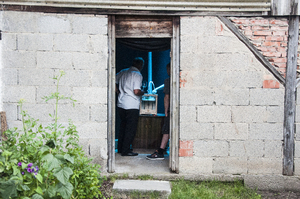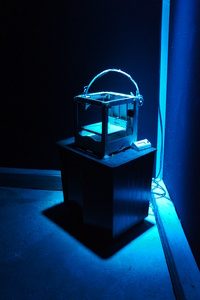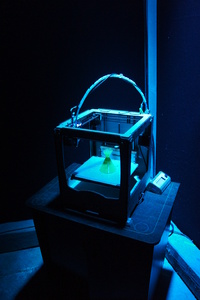"Installation"
| Begriff | Installation |
| Metakey | Kategorie (institution:project_category) |
| Typ | Keyword |
| Vokabular | HfG |
488 Inhalte
- Seite 1 von 41
Lila
- Titel
- Lila
- Autor/in
- Kategorie
- Datierung
- 26.06.2016 - 27.06.2016
- Ort
- Körnerstraße 7
76356 Weingarten
- Körnerstraße 7
- Titel
- Lila
- Urheberrechtshinweis
- © Jan Cordes
- Rechtsschutz/Lizenz
- Beziehung/Funktion
- Semester
- Studiengang
- Typ der Abschlussarbeit
- Importiert am
- 30.08.2024
- Übergeordnete Sets
- 1
Kunststoffpalast
- Titel
- Kunststoffpalast
- Autor/in
- Kategorie
- Titel
- Kunststoffpalast
- Titel (en)
- Plastic Palace
- Urheberrechtshinweis
- © Jannis Zell
- Rechtsschutz/Lizenz
- Freigabe Nutzung HfG
- Medienersteller/in
- Beziehung/Funktion
- Medien-Beschreibung
- "Als der französische Schriftsteller Roland Barthes Mitte der 1950er Jahre eine Kunststoff-Ausstellung besuchte, interpretierte er das Gesehene in mythischen Begriffen. Nicht nur, dass diese Stoffe "Namen griechischer Hirten (Polystyrol, Polyvinyl)" trugen, sie waren auch die Produkte einer Art Alchemie: "Das Publikum wartet in einer langen Schlange, um der Vollendung der magischen Operation schlechthin beizuwohnen: der Transmutation der Materie."
-Auszüge aus Roland Barthes, "Plastik", Mythen, 1957 (eigene Übersetzung)
Zwischen 4,8 und 12,7 Millionen Tonnen Plastik gelangen jedes Jahr in die Ozeane, so die Zahlen, die 2015 in der Zeitschrift Science veröffentlicht wurden.
Mittlerweile schwimmt und sinkt Plastik in allen Teilen des Ozeans. Mikroplastik, das darauf wartet, in Nano-Netzen gefangen zu werden. Aufgefangene Stücke roter Partybecher, grüner und weißer Strohhalme, gelber Tüten und Partikel des längst verschwundenen PETE, HDP, V, LDPE, PS und OTHER bilden die Säulen und Hallen des Plastikpalastes als Reminiszenz an das Zeitalter des Plastiks.
Modell: 60 × 126 × 83 cm Styropor, PU, PP, HDPE, PE, PET, EVA
- "Als der französische Schriftsteller Roland Barthes Mitte der 1950er Jahre eine Kunststoff-Ausstellung besuchte, interpretierte er das Gesehene in mythischen Begriffen. Nicht nur, dass diese Stoffe "Namen griechischer Hirten (Polystyrol, Polyvinyl)" trugen, sie waren auch die Produkte einer Art Alchemie: "Das Publikum wartet in einer langen Schlange, um der Vollendung der magischen Operation schlechthin beizuwohnen: der Transmutation der Materie."
- Medien-Beschreibung (en)
- “When the French writer Roland Barthes went to a plastics exhibition in the mid-1950s, he interpreted what he saw in mythical terms. Not only did these substances have “names of Greek shepherds (Polystyrene, Polyvinyl)”, but they were the products of a kind of alchemy: “the public waits in a long queue in order to witness the accomplishment of the magical operation par excellence: the transmutation of matter.”
-Excerpts from Roland Barthes, “Plastic”, Myths, 1957
Between 4.8 and 12.7 million tonnes of plastic enter the ocean each year, according to figures published in the journal Science in 2015.
In the meantime plastics have floated onto and sunken into all parts of the ocean. Microplastic waiting to be caught in nano-nets. Harvested pieces of red party cups, green and white straws, yellow bags and particles of the long gone PETE, HDP, V, LDPE, PS and OTHER make up the columns and halls of the Plastic Palace in reminiscence of the age of plastic.
Model: 60 × 126 × 83 cm Styrofoam, PU, PP, HDPE, PE, PET, EVA
- “When the French writer Roland Barthes went to a plastics exhibition in the mid-1950s, he interpreted what he saw in mythical terms. Not only did these substances have “names of Greek shepherds (Polystyrene, Polyvinyl)”, but they were the products of a kind of alchemy: “the public waits in a long queue in order to witness the accomplishment of the magical operation par excellence: the transmutation of matter.”
- Projektleiter/in
- Semester
- Studiengang
- Typ der Abschlussarbeit
- Importiert am
- 31.07.2024
- Übergeordnete Sets
- 1
Konzepttext
- Titel
- Konzepttext
- Autor/in
- Kategorie
- Typ des Projekts/Werks
- Schlagworte
- Titel
- Konzepttext
- Urheberrechtshinweis
- © Johanna Hoth
- Rechtsschutz/Lizenz
- Freigabe Nutzung HfG
- Medienersteller/in
- Beziehung/Funktion
- Semester
- Studiengang
- Typ der Abschlussarbeit
- Importiert am
- 30.07.2024
- Übergeordnete Sets
- 1
Koboldohren
- Titel
- Koboldohren
- Autor/in
- Kategorie
- Datierung
- 06.12.2023
- Ort: Institution
- Stadt
- Land
- Titel
- Koboldohren
- Titel (en)
- goblin ears
- Urheberrechtshinweis
- © Jonathan Blaschke
- Rechtsschutz/Lizenz
- Medienersteller/in
- Beziehung/Funktion
- Medien-Beschreibung
- Die Fotografie zeigt eines der Requisiten.
- Medien-Beschreibung (en)
- The photograph shows one of the props.
- Semester
- Studiengang
- Typ der Abschlussarbeit
- Importiert am
- 15.02.2024
- Übergeordnete Sets
- 1
Known Unknown
- Titel
- Known Unknown
- Kategorie
- Schlagworte
- Datierung
- 05.07.2025
- Ort: Institution
- Stadt
- Land
- Beteiligte Institution(en)
- Titel
- Known Unknown
- Urheberrechtshinweis
- Chelsea Kim, Josephine Leicht
- Rechtsschutz/Lizenz
- Freigabe Nutzung HfG
- Medienersteller/in
- Beziehung/Funktion
- Studiengang
- Importiert am
- 06.07.2025
- Übergeordnete Sets
- 1
Known Unknown
- Titel
- Known Unknown
- Kategorie
- Schlagworte
- Datierung
- 05.07.2025
- Ort: Institution
- Stadt
- Land
- Beteiligte Institution(en)
- Titel
- Known Unknown
- Urheberrechtshinweis
- Chelsea Kim, Josephine Leicht
- Rechtsschutz/Lizenz
- Freigabe Nutzung HfG
- Medienersteller/in
- Beziehung/Funktion
- Studiengang
- Importiert am
- 06.07.2025
- Übergeordnete Sets
- 1
Kenotaph für die Bienen
- Titel
- Kenotaph für die Bienen
- Autor/in
- Kategorie
- Titel
- Kenotaph für die Bienen
- Titel (en)
- Cenotaph to the bees
- Urheberrechtshinweis
- © Jannis Zell
- Rechtsschutz/Lizenz
- Freigabe Nutzung HfG
- Medienersteller/in
- Beziehung/Funktion
- Medien-Beschreibung
- "Sie werden sie wahrscheinlich mehr als einmal in einer verlassenen Ecke Ihres Gartens in den Büschen herumflattern gesehen haben, ohne zu bemerken, dass Sie achtlos den ehrwürdigen Vorfahren beobachteten, dem wir wahrscheinlich die meisten unserer Blumen und Früchte verdanken (denn es wird tatsächlich geschätzt, dass mehr als hunderttausend Pflanzensorten verschwinden würden, wenn die Bienen sie nicht besuchen würden), und möglicherweise sogar unsere Zivilisation, denn in diesen Geheimnissen sind alle Dinge miteinander verflochten."
-Das Leben der Biene, Maurice Maeterlinck, G. Allen, London, 1901 (eigene Übersetzung)
Der Kenotaph für die Bienen ist ein Mahnmal, das an alle ausgestorbenen Bienen der Erde erinnert. Das Wachs macht es zu einem temporären Denkmal. Es ist zerbrechlich bei Berührung und Hitze.
Modell: 120 × 98 × 50 cm Styropor, Bienenwachs, Paraffin
- "Sie werden sie wahrscheinlich mehr als einmal in einer verlassenen Ecke Ihres Gartens in den Büschen herumflattern gesehen haben, ohne zu bemerken, dass Sie achtlos den ehrwürdigen Vorfahren beobachteten, dem wir wahrscheinlich die meisten unserer Blumen und Früchte verdanken (denn es wird tatsächlich geschätzt, dass mehr als hunderttausend Pflanzensorten verschwinden würden, wenn die Bienen sie nicht besuchen würden), und möglicherweise sogar unsere Zivilisation, denn in diesen Geheimnissen sind alle Dinge miteinander verflochten."
- Medien-Beschreibung (en)
- “You will probably more than once have seen her fluttering about the bushes, in a deserted corner of your garden, without realising that you were carelessly watching the venerable ancestor to whom we probably owe most of our flowers and fruits (for it is actually estimated that more than a hundred thousand varieties of plants would disappear if the bees did not visit them), and possibly even our civilization, for in these mysteries all things intertwine.”
-The Life of the Bee, Maurice Maeterlinck, G. Allen, London, 1901
The Cenotaph to the Bees is a memorial commemorating all the extinct bees of the Earth. The wax makes it a temporary monument. It is fragile to touch and heat.
Model: 120 × 98 × 50 cm Styrofoam, bees wax, paraffin
- “You will probably more than once have seen her fluttering about the bushes, in a deserted corner of your garden, without realising that you were carelessly watching the venerable ancestor to whom we probably owe most of our flowers and fruits (for it is actually estimated that more than a hundred thousand varieties of plants would disappear if the bees did not visit them), and possibly even our civilization, for in these mysteries all things intertwine.”
- Projektleiter/in
- Semester
- Studiengang
- Typ der Abschlussarbeit
- Importiert am
- 31.07.2024
- Übergeordnete Sets
- 1
Kenotaph für die Bienen
- Titel
- Kenotaph für die Bienen
- Autor/in
- Kategorie
- Titel
- Kenotaph für die Bienen
- Titel (en)
- Cenotaph to the bees
- Urheberrechtshinweis
- © Jannis Zell
- Rechtsschutz/Lizenz
- Freigabe Nutzung HfG
- Medienersteller/in
- Beziehung/Funktion
- Medien-Beschreibung
- "Sie werden sie wahrscheinlich mehr als einmal in einer verlassenen Ecke Ihres Gartens in den Büschen herumflattern gesehen haben, ohne zu bemerken, dass Sie achtlos den ehrwürdigen Vorfahren beobachteten, dem wir wahrscheinlich die meisten unserer Blumen und Früchte verdanken (denn es wird tatsächlich geschätzt, dass mehr als hunderttausend Pflanzensorten verschwinden würden, wenn die Bienen sie nicht besuchen würden), und möglicherweise sogar unsere Zivilisation, denn in diesen Geheimnissen sind alle Dinge miteinander verflochten."
-Das Leben der Biene, Maurice Maeterlinck, G. Allen, London, 1901 (eigene Übersetzung)
Der Kenotaph für die Bienen ist ein Mahnmal, das an alle ausgestorbenen Bienen der Erde erinnert. Das Wachs macht es zu einem temporären Denkmal. Es ist zerbrechlich bei Berührung und Hitze.
Modell: 120 × 98 × 50 cm Styropor, Bienenwachs, Paraffin
- "Sie werden sie wahrscheinlich mehr als einmal in einer verlassenen Ecke Ihres Gartens in den Büschen herumflattern gesehen haben, ohne zu bemerken, dass Sie achtlos den ehrwürdigen Vorfahren beobachteten, dem wir wahrscheinlich die meisten unserer Blumen und Früchte verdanken (denn es wird tatsächlich geschätzt, dass mehr als hunderttausend Pflanzensorten verschwinden würden, wenn die Bienen sie nicht besuchen würden), und möglicherweise sogar unsere Zivilisation, denn in diesen Geheimnissen sind alle Dinge miteinander verflochten."
- Medien-Beschreibung (en)
- “You will probably more than once have seen her fluttering about the bushes, in a deserted corner of your garden, without realising that you were carelessly watching the venerable ancestor to whom we probably owe most of our flowers and fruits (for it is actually estimated that more than a hundred thousand varieties of plants would disappear if the bees did not visit them), and possibly even our civilization, for in these mysteries all things intertwine.”
-The Life of the Bee, Maurice Maeterlinck, G. Allen, London, 1901
The Cenotaph to the Bees is a memorial commemorating all the extinct bees of the Earth. The wax makes it a temporary monument. It is fragile to touch and heat.
Model: 120 × 98 × 50 cm Styrofoam, bees wax, paraffin
- “You will probably more than once have seen her fluttering about the bushes, in a deserted corner of your garden, without realising that you were carelessly watching the venerable ancestor to whom we probably owe most of our flowers and fruits (for it is actually estimated that more than a hundred thousand varieties of plants would disappear if the bees did not visit them), and possibly even our civilization, for in these mysteries all things intertwine.”
- Projektleiter/in
- Semester
- Studiengang
- Typ der Abschlussarbeit
- Importiert am
- 31.07.2024
- Übergeordnete Sets
- 1
Karlsruhe
- Titel
- Karlsruhe
- Autor/in
- Kategorie
- Schlagworte
- Datierung
- Mai 2021
- Ort: Institution
- Ort
- Großes Studio
- Stadt
- Land
- Titel
- Karlsruhe
- Urheberrechtshinweis
- © Carina Fenderich
- Rechtsschutz/Lizenz
- Freigabe Nutzung HfG
- Medienersteller/in
- Beziehung/Funktion
- Projektleiter/in
- Semester
- Studiengang
- Typ der Abschlussarbeit
- Importiert am
- 14.06.2024
- Übergeordnete Sets
- 1
Hellblau
- Titel
- Hellblau
- Autor/in
- Kategorie
- Datierung
- 26.06.2016 - 27.06.2016
- Ort
- Körnerstraße 7
76356 Weingarten
- Körnerstraße 7
- Titel
- Hellblau
- Urheberrechtshinweis
- © Jan Cordes
- Rechtsschutz/Lizenz
- Beziehung/Funktion
- Semester
- Studiengang
- Typ der Abschlussarbeit
- Importiert am
- 30.08.2024
- Übergeordnete Sets
- 1
Hellblau
- Titel
- Hellblau
- Autor/in
- Kategorie
- Datierung
- 26.06.2016 - 27.06.2016
- Ort
- Körnerstraße 7
76356 Weingarten
- Körnerstraße 7
- Titel
- Hellblau
- Urheberrechtshinweis
- © Jan Cordes
- Rechtsschutz/Lizenz
- Beziehung/Funktion
- Semester
- Studiengang
- Typ der Abschlussarbeit
- Importiert am
- 30.08.2024
- Übergeordnete Sets
- 1
Hellblau
- Titel
- Hellblau
- Autor/in
- Kategorie
- Datierung
- 26.06.2016 - 27.06.2016
- Ort
- Körnerstraße 7
76356 Weingarten
- Körnerstraße 7
- Titel
- Hellblau
- Urheberrechtshinweis
- © Jan Cordes
- Rechtsschutz/Lizenz
- Beziehung/Funktion
- Semester
- Studiengang
- Typ der Abschlussarbeit
- Importiert am
- 30.08.2024
- Übergeordnete Sets
- 1
